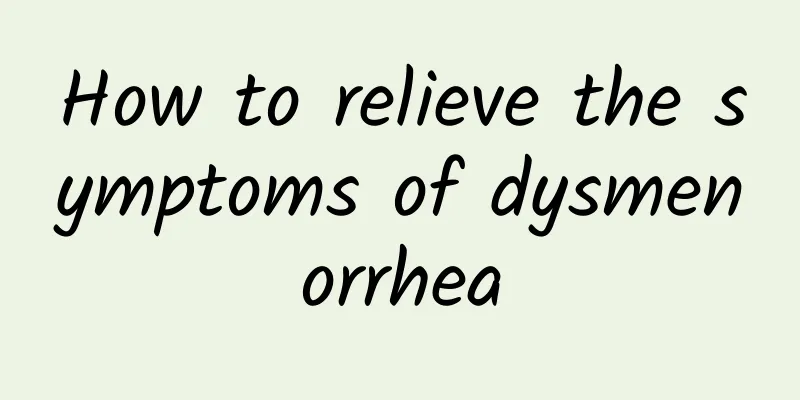What causes uterine fibroid pain? What to do if uterine fibroid pain

|
What causes uterine fibroid pain? What to do if uterine fibroid pain Uterine fibroids are a common gynecological disease that affects the quality of life of many women. Among them, pain is one of the most common symptoms of patients with uterine fibroids. So, what exactly causes the pain of uterine fibroids? This article will give you a detailed answer and provide some ways to relieve the pain. 1. Pain caused by uterine fibroids Uterine fibroids are benign tumors formed by excessive proliferation of muscle tissue in the uterus. They cause the uterus and surrounding tissues to swell and compress, which in turn causes pain. Generally speaking, the pain of uterine fibroids will manifest as periodic abdominal pain, which can be of different degrees and natures. This is because uterine fibroids may cause uterine contractions, obstruct blood supply, and compress nerves. 2. Pain caused by gynecological inflammation Gynecological inflammation is another common cause of pain in patients with uterine fibroids. When uterine fibroids are present, infection may occur in the cervix or uterine cavity, causing an inflammatory response. The inflammatory response stimulates nerve endings, leading to pain. 3. Pain caused by the location of uterine fibroids The location of the fibroid may also be a cause of pain. Fibroids can grow in the endometrium, myometrium, or uterine wall, and their location will affect the severity and nature of the pain. For example, if the fibroid is located near the endometrium, it may cause menstrual pain or pain during sexual intercourse. If the fibroid grows to the uterine wall, the pressure on the surrounding tissue may cause long-term dull pain. 4. How to relieve the pain of uterine fibroids 1. Non-drug treatment methods Keep moderate exercise. Proper exercise can promote blood circulation and relieve pain. Hot compress is also an effective way to relieve pain. You can use a hot water bottle or hot compress patch on the affected area. 2. Drug treatment Drug treatment is a common way to relieve the pain of uterine fibroids. Commonly used drugs include analgesics, anti-inflammatory drugs and oral contraceptives. However, they should be used under the guidance of a doctor and follow the correct dosage and time of use. 3. Surgical treatment In some cases of severe pain or obvious symptoms, surgical treatment may be a necessary option. Uterine fibroids can be removed through conservative surgery or minimally invasive surgery. Before surgery, a comprehensive evaluation should be conducted and the doctor should be fully informed of the risks and effects of the surgery. Uterine fibroids are a common gynecological disease, and the pain may be caused by a variety of reasons. Understanding these reasons can help patients better cope with the pain. In the process of treating uterine fibroids, you should choose the appropriate pain relief method according to your individual situation, such as non-drug treatment, drug treatment or surgical treatment. The most important thing is to work closely with your doctor throughout the treatment process and have regular checkups and follow-ups. |
>>: What are the effects of uterine fibroids on the body? Are uterine fibroids harmful to the body?
Recommend
What is the approximate age of menopause in women?
Each age group has a different physiological cycl...
Everyone should pay more attention to painless abortion
Have you ever had a painless abortion? There are ...
Why does leucorrhea smell like fish? Urinary or reproductive tract infection
Abnormal vaginal discharge is usually caused by u...
Can abortion be cured? Treat the symptoms
Miscarriage can be cured as long as the main caus...
How to recover from threatened abortion
After the treatment of threatened abortion, you n...
Causes of vulvar leukoplakia Understand these 5 situations and prevent vulvar leukoplakia in time
Vulvar leukoplakia is a gynecological disease. It...
What to eat after a missed abortion
After a missed abortion, dietary conditioning is ...
How to prevent vaginitis from the details of life?
How to prevent vaginitis from the details of life...
Four most effective methods for diagnosing ectopic pregnancy
Ectopic pregnancy is a common symptom of gynecolo...
"Light" tonic in winter! Wolfberry and crucian carp soup nourishes the body and brain
The cold winter is coming, which means it’s time ...
Sitting for a long time will cause muscle weakness and damage your brain. Practice these 5 muscle strength training techniques every day and experience the improvement of your brain power in 8 weeks.
Not only does sitting for long periods of time ma...
What are the symptoms of early cervical erosion? Check out the early symptoms of cervical erosion
Cervical erosion is a common gynecological diseas...
Women of childbearing age should pay attention to the symptoms of cervical hypertrophy when leucorrhea increases
Women of childbearing age should always be alert ...
Eating enough does not mean eating well! Find out whether you are malnourished in 1 minute
Since 80-year-old Grandpa Li fell and injured him...
What are the symptoms of adnexitis?
Many women suffer from adnexitis. Then some peopl...









